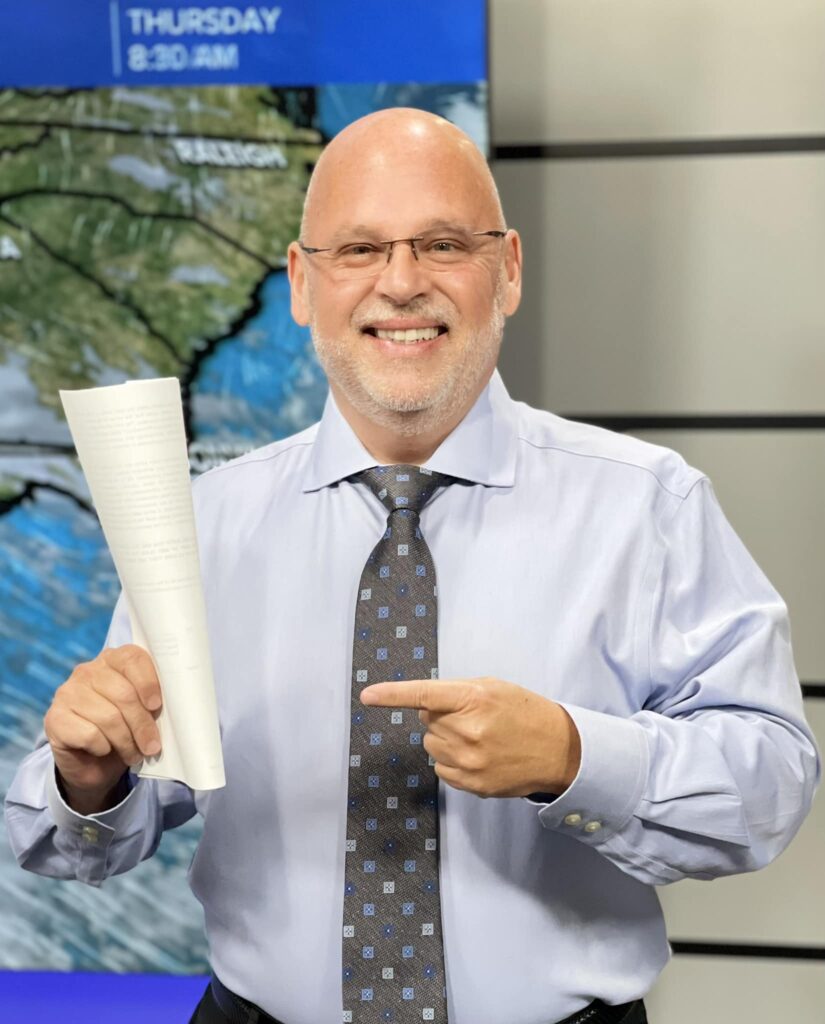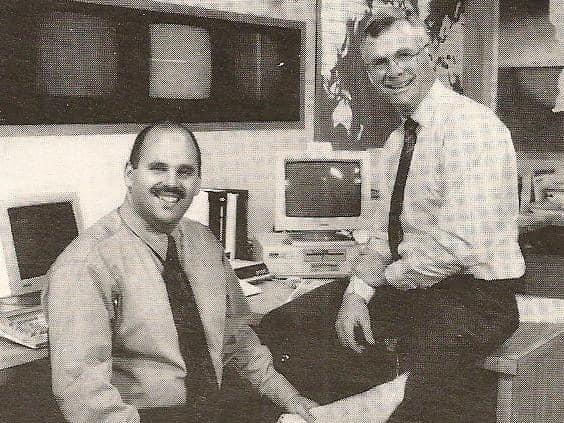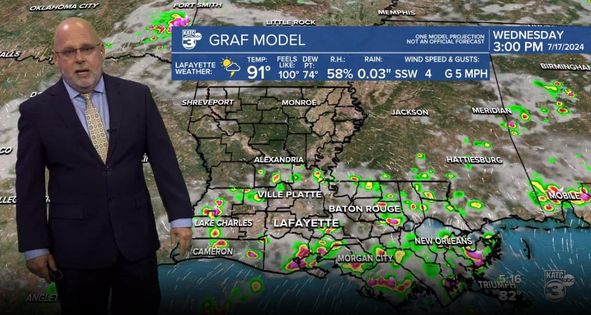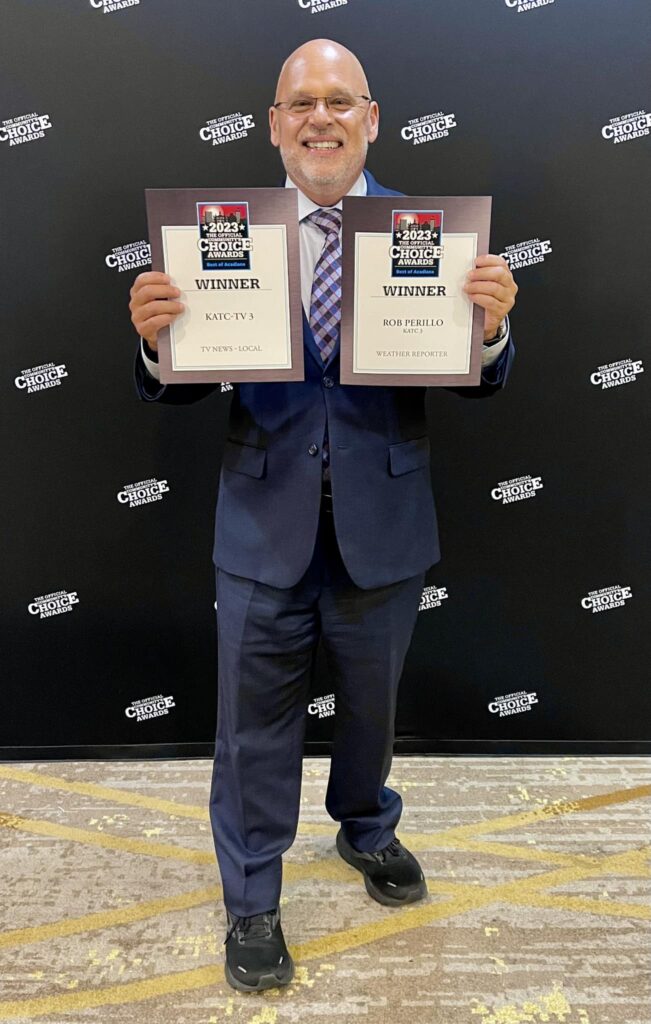Fique off-line com o app Player FM !
Rob Perillo – Chief Meteorologist for KATC-TV3
Manage episode 434643588 series 1814016
Rob Perillo has decades of experience in forecasting Acadiana’s weather and has tracked hundreds of tropical storms and hurricanes during his career.
He celebrated 20 years at KATC this January and is one of the most beloved meteorologists in the country, particularly well-known for his expertise in covering hurricanes and severe weather events.

Last year, Rob Perillo extended his contract with KATC for another five years. He’s pictured here in November 2023 celebrating the occasion. Rob has enjoyed Lafayette since moving here 36 years ago when he was recruited by KLFY. Married with two children, he enjoys exercising every day for an hour, either riding his bike (on Lafayette’s roads!) or swimming. His children are both artists and live in Lafayette; he expressed his joy in being able to be present while supporting Joe and Olivia in their endeavors. He has been with KATC since 2004.
A native of New York, Rob Perillo became interested in thunderstorm activity as a young boy, four or five years old. His family had just moved out of the Bronx into the suburbs and a severe thunderstorm rolled through. He remembers how scary it was, but it triggered his interest in learning more about the weather.
“Fear grew less, and curiosity grew more. By the time I was in third grade, I knew I wanted to be a meteorologist”, says Rob. During that third grade year, Rob built a kite for a project and while he called the endeavor a ‘big flop,’ he wanted to know more about what creates the wind and how we can use it. He started buying weather books written for school-age children and they are still with him in the KATC weather room today.
When he was in sixth grade, there was a snowstorm forecastedfor the Northeastern U. S. Meteorologists were projecting the snow would turn into rain, but Rob had a different feeling about it. He told his friends….”No, we’ll just have snow. 1 1/2 feet.” Well, the storm produced two feet of snow and school was cancelled for the rest of the week. Rob said, “I was the school hero when we returned to school on Monday.” His intuition had been right on.
Always interested in science, since his days of watching Jacques Cousteau on television, Rob earned a degree in Meteorology (with an emphasis on Math) from the State University of New York in Oswego in 1983. He selected that school not only for its meteorology program, but because it had the highest amount of snow in New York averaging 144 inches of snow per year.
Rob began his career managing research at the State University of New York Research Foundation, while also serving as an Emergency Planning Meteorologist for several nuclear power plants in Upstate New York. He developed emergency procedures in case of nuclear leakage. He then moved to Houston and served as an Aviation Forecaster for Air Routing International, and a Marine and Industrial Meteorologist for Wilkens Weather Technologies, in Houston, Texas.

Rob Perillo had never thought about television as a career but a friend at Wilkins Weather Technologies encouraged him to make a tape and apply for positions. A year later, in 1988, KLFY reached out to him. He had the opportunity to work with greats such as Maria Placer, Dick Faurot, and Jim Baronet. Rob joined KATC in 2004, when he was offered a fifteen-year contract, a feat unheard of in television circles.
Becoming a tv meteorologist was a reach for Rob, as he was “confident in my forecasting skills, but a bit anxious about talking in front of other people. But you learn if you’re a master of your information, it will be okay.” One thing he did have to work on was conquering his New York accent to deliver the news in a way that was more readily accepted locally.
Rob is passionate about meteorology and studies trends in climate and weather. About 16 to 17 years ago, he became aware that warming trends were coming upon us worldwide and he wanted to know how that impacted hurricanes. While we used to have five days per year that averaged 95 degrees, now there are 40 to 50.
Over the past ten years, summer days can average in the upper 90 degrees, with an average low in the lower 80 degrees. “The trends of warming are increasing exponentially. Warmer atmospheres hold more moisture, so when it rains, it’s a larger event with more rainfall. Rainfall intensity has increased by 405, and the frequency of heavy rain has increased by 30 to 40% over the past few years. A typical summer thunderstorm will push 2 inches easily in one hour. Now more systems push 3 to 4 inches per hour. While there is no net change in the number of systems, hurricanes are going through rapid intensification cycles more frequently. Look at Harvey, Michael, Barry, Laura, Delta, Ida, Zeta, and Sally in the last several years.

“The number of 95 degree days has gone off the charts. This year we are more prone to hurricane activity.”
Tropical systems also move more slowly, leading to heavier rainfall in areas. “2016 was one of the wettest years on record. It was definitely a climate footprint. In the Northeast, theyre going to see much more activity than in the past. The average return period (for hurricanes) was once every 75 years for a Category 3 hurricane; now it is down to once every 25 to 30 years. Increased heat causes hurricanes to travel farther.”
Rob would get up in the middle of the night to film Space Shuttles coming in: “I’ve never seen anything more beautiful.” Unfortunately, on February 1, 2003, he was filiming the Columbia Space Shuttle as it was re-entering the earth’s orbit. He say parts flying off, disintegrating mid-air. He shot the film, then called NASA as a trained spotter to report the disaster. He ended up being interviewed by CNN, CBS, and others.
For people who choose to stay home and ride out a Category 3 hurricane, Rob says, “You want to get the heck out of Dodge” for these events. Sustained winds of up to 111 to 129 mile per hour winds are not to be taken lightly. Wind damage and tornadic activity are just as deadly as rising waters.

Rob Perillo’s days are long. Appearing each day on the 5, 6, and 10 pm KATC newscast, he doesn’t get home until after 11:30 pm. and during hurricane season he takes the time before bed to look at computer models. He is devoted to keeping up with his industry, and listens to weather-related podcasts while exercising, recommending Dr. Hal Needham’s Geotrek podcast and Weather Geeks. He keeps up with the latest research on climatology and meteorology.

Closing words from Rob Perillo: “Follow your passion. Don’t follow the money, follow the passion. Be good at it, be enthralled with it. If it gives you joy, do something with it. Be a master of it. If you can put food on the table doing it, you are truly a rich person.”
We thank Rob Perillo for his dedication to meteorology and for his engaging and informative broadcasts! Check him out at https://www.katc.com/ and on air each weeknight at 5, 6 and 10 p.m, or on special weather coverage events.
103 episódios
Manage episode 434643588 series 1814016
Rob Perillo has decades of experience in forecasting Acadiana’s weather and has tracked hundreds of tropical storms and hurricanes during his career.
He celebrated 20 years at KATC this January and is one of the most beloved meteorologists in the country, particularly well-known for his expertise in covering hurricanes and severe weather events.

Last year, Rob Perillo extended his contract with KATC for another five years. He’s pictured here in November 2023 celebrating the occasion. Rob has enjoyed Lafayette since moving here 36 years ago when he was recruited by KLFY. Married with two children, he enjoys exercising every day for an hour, either riding his bike (on Lafayette’s roads!) or swimming. His children are both artists and live in Lafayette; he expressed his joy in being able to be present while supporting Joe and Olivia in their endeavors. He has been with KATC since 2004.
A native of New York, Rob Perillo became interested in thunderstorm activity as a young boy, four or five years old. His family had just moved out of the Bronx into the suburbs and a severe thunderstorm rolled through. He remembers how scary it was, but it triggered his interest in learning more about the weather.
“Fear grew less, and curiosity grew more. By the time I was in third grade, I knew I wanted to be a meteorologist”, says Rob. During that third grade year, Rob built a kite for a project and while he called the endeavor a ‘big flop,’ he wanted to know more about what creates the wind and how we can use it. He started buying weather books written for school-age children and they are still with him in the KATC weather room today.
When he was in sixth grade, there was a snowstorm forecastedfor the Northeastern U. S. Meteorologists were projecting the snow would turn into rain, but Rob had a different feeling about it. He told his friends….”No, we’ll just have snow. 1 1/2 feet.” Well, the storm produced two feet of snow and school was cancelled for the rest of the week. Rob said, “I was the school hero when we returned to school on Monday.” His intuition had been right on.
Always interested in science, since his days of watching Jacques Cousteau on television, Rob earned a degree in Meteorology (with an emphasis on Math) from the State University of New York in Oswego in 1983. He selected that school not only for its meteorology program, but because it had the highest amount of snow in New York averaging 144 inches of snow per year.
Rob began his career managing research at the State University of New York Research Foundation, while also serving as an Emergency Planning Meteorologist for several nuclear power plants in Upstate New York. He developed emergency procedures in case of nuclear leakage. He then moved to Houston and served as an Aviation Forecaster for Air Routing International, and a Marine and Industrial Meteorologist for Wilkens Weather Technologies, in Houston, Texas.

Rob Perillo had never thought about television as a career but a friend at Wilkins Weather Technologies encouraged him to make a tape and apply for positions. A year later, in 1988, KLFY reached out to him. He had the opportunity to work with greats such as Maria Placer, Dick Faurot, and Jim Baronet. Rob joined KATC in 2004, when he was offered a fifteen-year contract, a feat unheard of in television circles.
Becoming a tv meteorologist was a reach for Rob, as he was “confident in my forecasting skills, but a bit anxious about talking in front of other people. But you learn if you’re a master of your information, it will be okay.” One thing he did have to work on was conquering his New York accent to deliver the news in a way that was more readily accepted locally.
Rob is passionate about meteorology and studies trends in climate and weather. About 16 to 17 years ago, he became aware that warming trends were coming upon us worldwide and he wanted to know how that impacted hurricanes. While we used to have five days per year that averaged 95 degrees, now there are 40 to 50.
Over the past ten years, summer days can average in the upper 90 degrees, with an average low in the lower 80 degrees. “The trends of warming are increasing exponentially. Warmer atmospheres hold more moisture, so when it rains, it’s a larger event with more rainfall. Rainfall intensity has increased by 405, and the frequency of heavy rain has increased by 30 to 40% over the past few years. A typical summer thunderstorm will push 2 inches easily in one hour. Now more systems push 3 to 4 inches per hour. While there is no net change in the number of systems, hurricanes are going through rapid intensification cycles more frequently. Look at Harvey, Michael, Barry, Laura, Delta, Ida, Zeta, and Sally in the last several years.

“The number of 95 degree days has gone off the charts. This year we are more prone to hurricane activity.”
Tropical systems also move more slowly, leading to heavier rainfall in areas. “2016 was one of the wettest years on record. It was definitely a climate footprint. In the Northeast, theyre going to see much more activity than in the past. The average return period (for hurricanes) was once every 75 years for a Category 3 hurricane; now it is down to once every 25 to 30 years. Increased heat causes hurricanes to travel farther.”
Rob would get up in the middle of the night to film Space Shuttles coming in: “I’ve never seen anything more beautiful.” Unfortunately, on February 1, 2003, he was filiming the Columbia Space Shuttle as it was re-entering the earth’s orbit. He say parts flying off, disintegrating mid-air. He shot the film, then called NASA as a trained spotter to report the disaster. He ended up being interviewed by CNN, CBS, and others.
For people who choose to stay home and ride out a Category 3 hurricane, Rob says, “You want to get the heck out of Dodge” for these events. Sustained winds of up to 111 to 129 mile per hour winds are not to be taken lightly. Wind damage and tornadic activity are just as deadly as rising waters.

Rob Perillo’s days are long. Appearing each day on the 5, 6, and 10 pm KATC newscast, he doesn’t get home until after 11:30 pm. and during hurricane season he takes the time before bed to look at computer models. He is devoted to keeping up with his industry, and listens to weather-related podcasts while exercising, recommending Dr. Hal Needham’s Geotrek podcast and Weather Geeks. He keeps up with the latest research on climatology and meteorology.

Closing words from Rob Perillo: “Follow your passion. Don’t follow the money, follow the passion. Be good at it, be enthralled with it. If it gives you joy, do something with it. Be a master of it. If you can put food on the table doing it, you are truly a rich person.”
We thank Rob Perillo for his dedication to meteorology and for his engaging and informative broadcasts! Check him out at https://www.katc.com/ and on air each weeknight at 5, 6 and 10 p.m, or on special weather coverage events.
103 episódios
Todos os episódios
×Bem vindo ao Player FM!
O Player FM procura na web por podcasts de alta qualidade para você curtir agora mesmo. É o melhor app de podcast e funciona no Android, iPhone e web. Inscreva-se para sincronizar as assinaturas entre os dispositivos.




